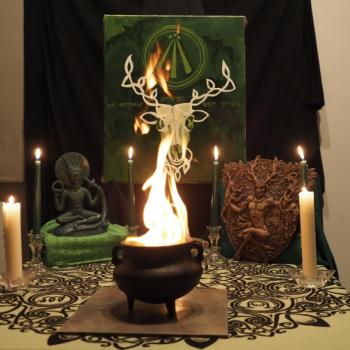Long time readers know I like to rant against the Evil Sorcerers of Madison Avenue – the advertising executives who do their best to convince you your life is worthless unless you buy what they’re selling. They use every magical technique short of demon invocation, and I’m not completely sure they don’t use that too. Political consultants do the same thing, trying to convince you that everything will be OK if you’ll just vote for their candidate.
If you’re reading this blog, you’re probably paying close enough attention to recognize these spells as they happen – they annoy you, but they don’t control you.
But you may not be aware of similar actions by people who are your friends, allies, and co-religionists. Oh, their motives are far less nefarious – they’re working on things that are good and important, things you support. And they’re not trying to control you… most of them, anyway. But an encounter with them always leaves you feeling like whatever you’re doing, it’s just not enough.
This happens with our friends who are passionate about their political work, their environmental work, or their religious work. It happens with those whose lives are devoted to giving their kids the happy childhood they never had. Passion is contagious… particularly when it’s mixed in with a good dose of guilt.
And before long, you start feeling like you ought to rearrange your priorities. Or you start feeling guilty because you haven’t rearranged them… or maybe because you can’t.
Let’s face it – the world has plenty of problems. Climate change, war, economic exploitation. Religious persecution (the real stuff, not “they didn’t say Merry Christmas!” whining), a militarized police force, and a malevolent toddler in the White House. And in the middle of all that, we’re still trying to live happy and fulfilling lives. It can feel overwhelming, like if we aren’t doing it all we’re letting people down.
This isn’t helpful. It’s not realistic.
Everything may be important. But everything can’t be first.
You can only have one main thing
Our mainstream society promotes multitasking – doing many things at once. But that’s not really what multitasking is. Multitasking is moving rapidly from one thing to another to another. When it enables you to make productive use of waiting time, it’s a good thing. Otherwise, it simply dilutes your focus and forces you to waste time trying to remember where you were when you set this thing down last time.
You can only work on one thing at a time. And only one of those things can be your top priority. It may all be important – if you have three sick kids you aren’t going to ignore two to take care of one. But if two have colds and one has cancer, it’s pretty obvious which one needs to be first.
Pick one thing. You shouldn’t have to think long – passion is usually pretty obvious. Consider the virtues of your philosophical and religious traditions. Consider your personal values. But make a conscious choice. That’s your main thing. A few weeks ago Strategic Sorcerer Jason Miller quoted business writer Stephen Covey: “The main thing is keeping the main thing the main thing.”
Nobody gets to tell you what your main thing is. Nobody gets to tell you it’s unimportant or selfish. If they do, you get to tell them to STFU.
If you can’t figure out what your main thing is (it took me until I was almost 40) that’s OK. You may have to try various things on for size – see what fits and what doesn’t. But even while you’re searching and experimenting, you can only have one main thing. Trying to have two or three or ten doesn’t work.
You can only have a few secondary things
Very few of us are single-minded. Even if we know exactly what our main thing is, we still have other interests and other concerns. Even if we believe climate change is the greatest threat facing humanity, we’re still concerned about insuring everyone has adequate health care and that our transgender friends are safe and accepted.
This is a good thing. There’s a word for people who are single-minded – obsessed. It’s not a healthy way to live.
We’re concerned about many things. And we have interests and passions that ultimately aren’t all that important but that fill our lives with joy: art and literature, food and wine, movies and sports. Even pumpkin spice… which for the record, I detest. But as the meme says, let people enjoy things.
You can have more than one of these, but you can’t have a lot – there’s just not time. But you can be passionate about one or two or maybe three things that aren’t your main thing, but that are still important to you.
You can support many different things
Politics may not be your main thing, but you can still do a bit of research and vote once or twice a year. Organized religion may not make your list of secondary things, but you can still show up to circle eight times a year and support your local Pagan group.
Groups and movements need leaders and they need dedicated contributors, but they also need tertiary members who provide support and who help them reach critical mass. This is why I continually emphasize that our Pagan religions and traditions need to have a place for accountants and plumbers as much for priests and mystics.
Even if you can’t fix what’s wrong, even if you can’t take a major role, even if you feel like what you’re not doing isn’t enough, if you can do something to make things better, that’s a good thing. Do what you can and don’t worry about what you can’t.
We need many different approaches, not just one
Those who are uber-passionate about their main thing are often certain that there’s only one way to achieve their goal, that total commitment is required, that partial measures just won’t do.
Perhaps they’re right – perhaps they know exactly what needs to be done and exactly what the outcome will be if it is done. Perhaps.
More likely, though, there are roadblocks and unintended consequences they’re overlooking. So rather than putting all our eggs in one basket, let’s try many different approaches. If something works well, we can give it more support and follow that path further. If it doesn’t, we can try something else instead.
We know some things won’t work: putting racists and fascists in public office never ends well. We don’t have to try every crackpot idea floated in political discourse.
But if people share our values and our goals but not our preferred methods, they’re still on our side. Let them pursue their version of the main thing while we pursue ours.
It’s OK to cheerlead – it’s not OK to manipulate
Promoting your main thing and your preferred methods is a good and necessary thing. If we’re passionate about something, it’s natural for us to tell all our friends about it and try to encourage them to check it out for themselves. Goodness knows I do enough of that here, advocating for my particular version of ancestral, devotional, ecstatic, oracular, magical, public, Pagan polytheism.
The same holds true for our social, political, and environmental causes. It’s even true for our preferred forms of art and entertainment. Passion – even over inconsequential things – is a joy to watch.
Until you become “that guy.” Until you become the coworker who won’t stop quoting scripture and inviting you to church every week. Until you start to manipulate people into supporting your main thing. “If stopping climate change isn’t your top priority, you don’t care about your children’s future.”
Your main thing isn’t everyone else’s main thing. When you try to manipulate others into supporting your cause, you’re behaving exactly like the Christian fundamentalists preaching on the street corner because they’re certain everybody who doesn’t believe like them is going to hell.
Our world has problems that are far more serious and far more urgent than whether or not pumpkin spice is any good or even which political party is the lesser evil. But they won’t be solved by preaching at people. They’ll be solved by showing people a better way, and leading them there with a vision of how things will be better when we get there.
Do what you do best
Many things are important, but only one thing can be first in your life. I can’t tell you what that main thing should be – and you can’t tell me what my main thing should be either.
Read. Listen. Pay attention. Pay particular attention to people whose voices are muffled because they say things that are uncomfortable or inconvenient. Meditate on your values, and on the virtues of your tradition, whatever it may be.
What’s most important to you? Where can you make the biggest impact? What do you do best?
Find your main thing, then keep your main thing the main thing.
What are your secondary passions? What one or two things do you need or want to do to live a good life – by your own standards? Make time for them.
What can you support in an ordinary, low-key way? Where can you write a check, make a phone call, or patronize something you want to see succeed? Doing good in a small way is still doing good – and lots of small good deeds add up.
And if people who mean well try to convince you you’re wrong because your main thing isn’t their main thing?
Just keep doing your thing, as deeply and as passionately as you can.
May your life and your great work – your main thing – be blessed!



















